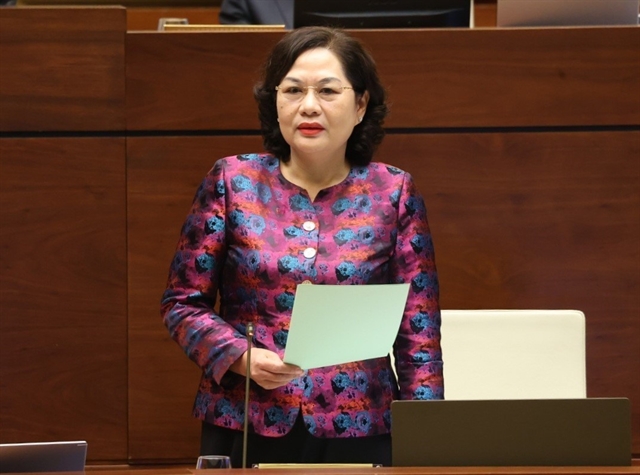 Economy
Economy


|
| State Bank governor Nguyễn Thị Hồng speaks at the National Assembly on May 29. — VNA/VNS Photo |
HÀ NỘI — The National Assembly continued discussions on May 29 on the draft to amend and supplement the Law on Credit Institutions, with a notable proposal to grant the State Bank of Việt Nam (SBV) expanded authority to issue special loans, including those without collateral and at 0-per-cent interest.
Under the proposed amendments, the SBV would be authorised to make rapid lending decisions to credit institutions in urgent situations of systemic risk or liquidity crisis.
This marks a shift from previous legislation, where such authority resided with the Prime Minister.
State Bank Governor Nguyễn Thị Hồng explained that the changes are necessary in light of rapid technological advancements and the increasing ease of banking transactions, which have made sudden mass withdrawals more likely.
In emergencies where there's a risk of systemic collapse, the State Bank must act swiftly, Hồng said. Lending without collateral and with a 0 per cent interest rate is extremely rare and only applies in very specific circumstances.
These special loans would be reserved for cases of having mass withdrawals that could destabilise the banking system, or for institutions under special supervision as they work on restructuring plans.
Typically, such loans still require collateral, often in the form of highly liquid assets or debts owed to the banks. Loans without collateral would only be issued in exceptional cases, when no suitable assets are available.
Deputy Trần Thị Thu Đông supported the regulation for its potential to enable rapid intervention during liquidity crises. However, she also voiced concerns over the absence of oversight mechanisms when collateral is not required, raising the possibility of misuse.
To address this, she proposed that the SBV be required to periodically report to the Government and National Assembly on all special loan activities, including borrowers, loan amounts, terms and outcomes.
She also called for clear criteria to determine eligible recipients of these loans to prevent abuse and ensure the support targets institutions genuinely in need.
Lawmakers also discussed the proposal on legalising the right for banks to seize collateral assets under clearly defined conditions.
The SBV argued that formalising this right would reduce risks and costs associated with bad debt resolution, thereby encouraging more lending at lower interest rates and boosting capital accessibility for businesses.
The draft law explicitly states that asset seizures must not be unilateral or unconditional. Instead, they must comply with strict procedures ensuring fairness, transparency, and the protection of all involved parties.
Another major proposal came from Deputy Huỳnh Thị Phúc, who highlighted the urgent need to foster the development of a debt trading market.
“In the current environment of rising non-performing loans, creating legal provisions for debt trading is essential,” Phúc said.
“This would encourage the formation of investment funds specialising in distressed assets and streamline large-scale debt transactions.”
Phúc also pointed to persistent legal and procedural barriers in transferring real estate projects used as collateral.
She urged lawmakers to clarify the legal effect of such transfers and set clear responsibilities and deadlines for coordination among relevant agencies. — VNS




